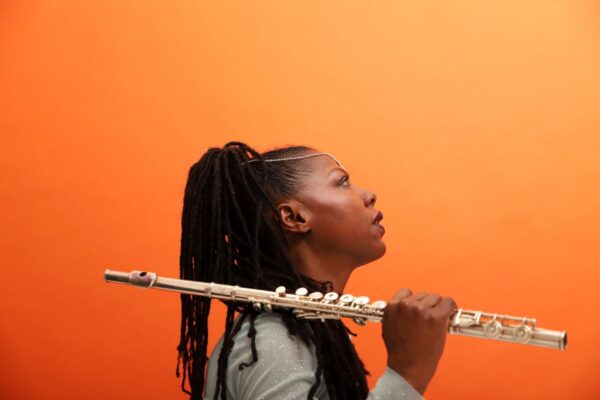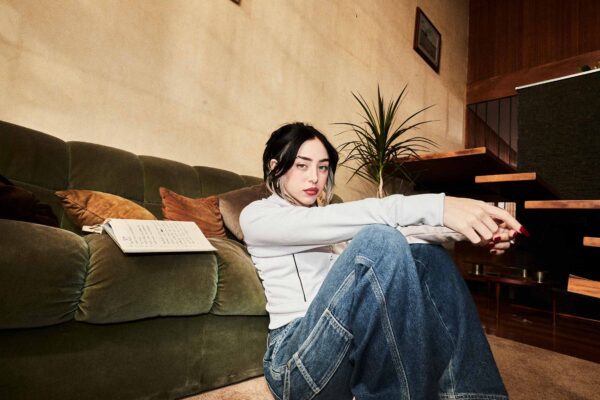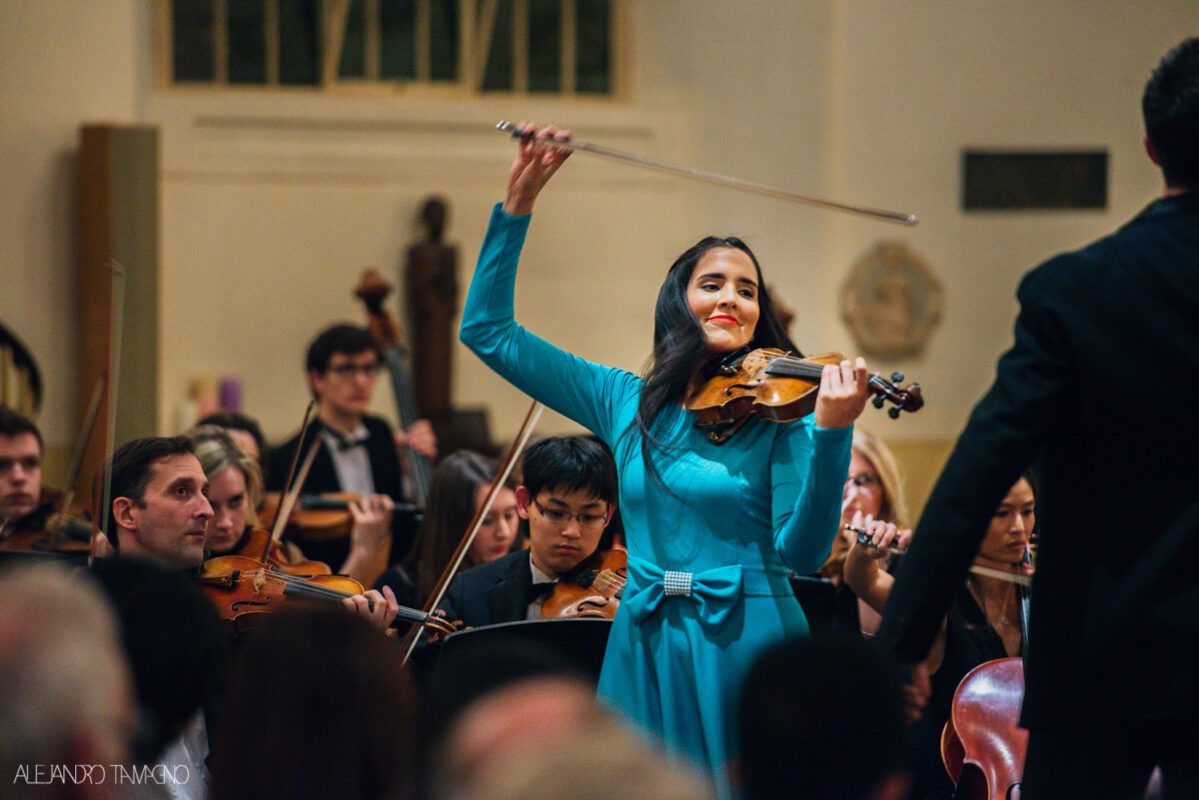
COFFEE WITH
AISHA SYED: “BEING BORN IN LATIN AMERICA IS ONE OF THE MOST IMPORTANT THINGS ABOUT ME”
Name: Aisha Syed
Profession: Violinist
Nationality: Dominican
Instagram: @aishasyedcastro
LATINNESS: Aisha, tell us a little about yourself. How did you start in the world of music?
AISHA: I started with the violin when I was five years old, because my sister started playing before me and I wanted to follow her — at that time I wanted to copy her in everything. We lived in Santiago, Dominican Republic, and my mother decided to have us learn an instrument so that we wouldn’t spend so much time locked up at home.
There came a point where some audition opportunities arose. In one of them, they told my mother “that girl you have is a genius.” She thought it was my sister, who is four years older than me, because she is super outgoing and used to stand out. I, on the other hand, always stood back because I didn’t like the spotlight. This was at the beginning. After that, my mother began paying a little more attention to me.
At 11 years old, I was presented with the enormous opportunity to make my debut as a soloist with the Dominican Republic’s National Symphony Orchestra. Shortly after, I also debuted at the Fine Arts, in the National Theater and in the Cibao Theater, the three most important in the country. It was then that my teacher told my mother: “Look ma’am, she already did everything there was to do as a soloist in the Dominican Republic. Let’s see if she can study abroad, either at the Yehudi Menuhin School or in Julliard.” I loved the idea of leaving, although, of course, I was very young.
Yehudi Menuhin School is a very small school that specializes in classical music where the rate of acceptance is minimal, but I didn’t care. I went, I auditioned, and by the grace of my Lord Jesus, I became the first Latin American to be accepted. So, I moved to London. It was a radical change.
My mother is Dominican and my father Pakistani, so there was already a bit of a mix. I was practically in boarding school and lived there most of the time. My mother came with me, rented an apartment and accompanied me for six months. Then she left and I was alone.
After seven and a half years, during which I had to adjust a few things in terms of technique, it was time to audition for college. My mother told me: “Look, you must earn the full scholarship, because if you don’t, you’ll have to come back to the Dominican Republic; the studies are very expensive, especially for an international student.”
In Europe, Austria and Germany they tend to give this kind of education for free, but not in Britain. There was only one scholarship a year for the two universities I was auditioning for: the Royal College of Music –where gigantic people from the last two or three centuries have studied, such as Leopold Stokowski, Gustav Holst, who was the composer of the Symphony of the Planets, and Benjamin Britten– and the Guildhall School, where they not only teach music, but also drama. Orlando Bloom, Daniel Craig and Jacqueline du Pré- the most prestigious cellist of the 20th century, whose performance of the Concerto for Edward Elgar’s cello is still a reference– they all studied here.
I auditioned at both and they both gave me the only full international student scholarship. I chose the Royal College of Music, where I finished my degree. Thanks to this, many doors opened for me for classical music concert tours with symphony orchestras. I’ve had the pleasure of playing on countless stages.
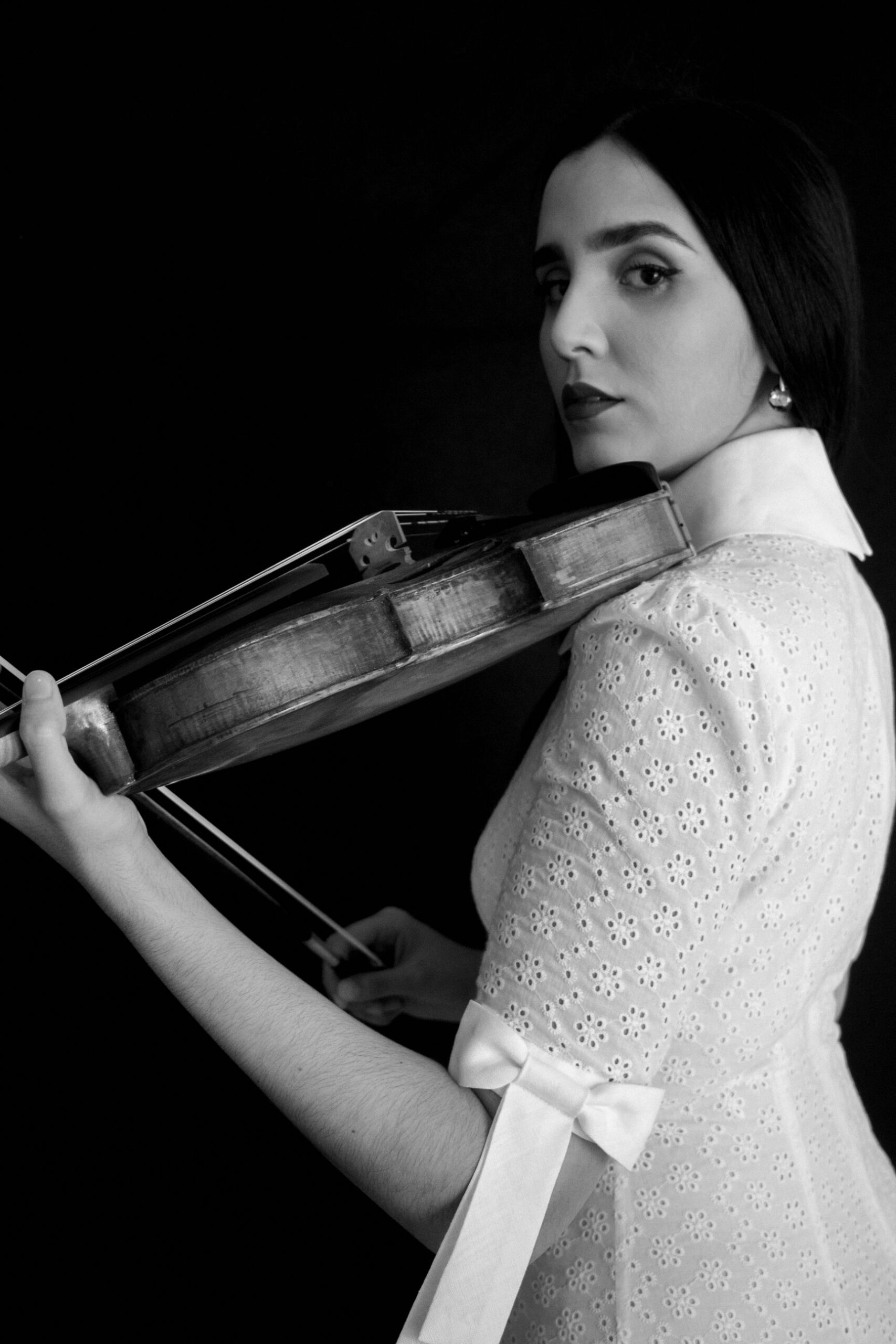
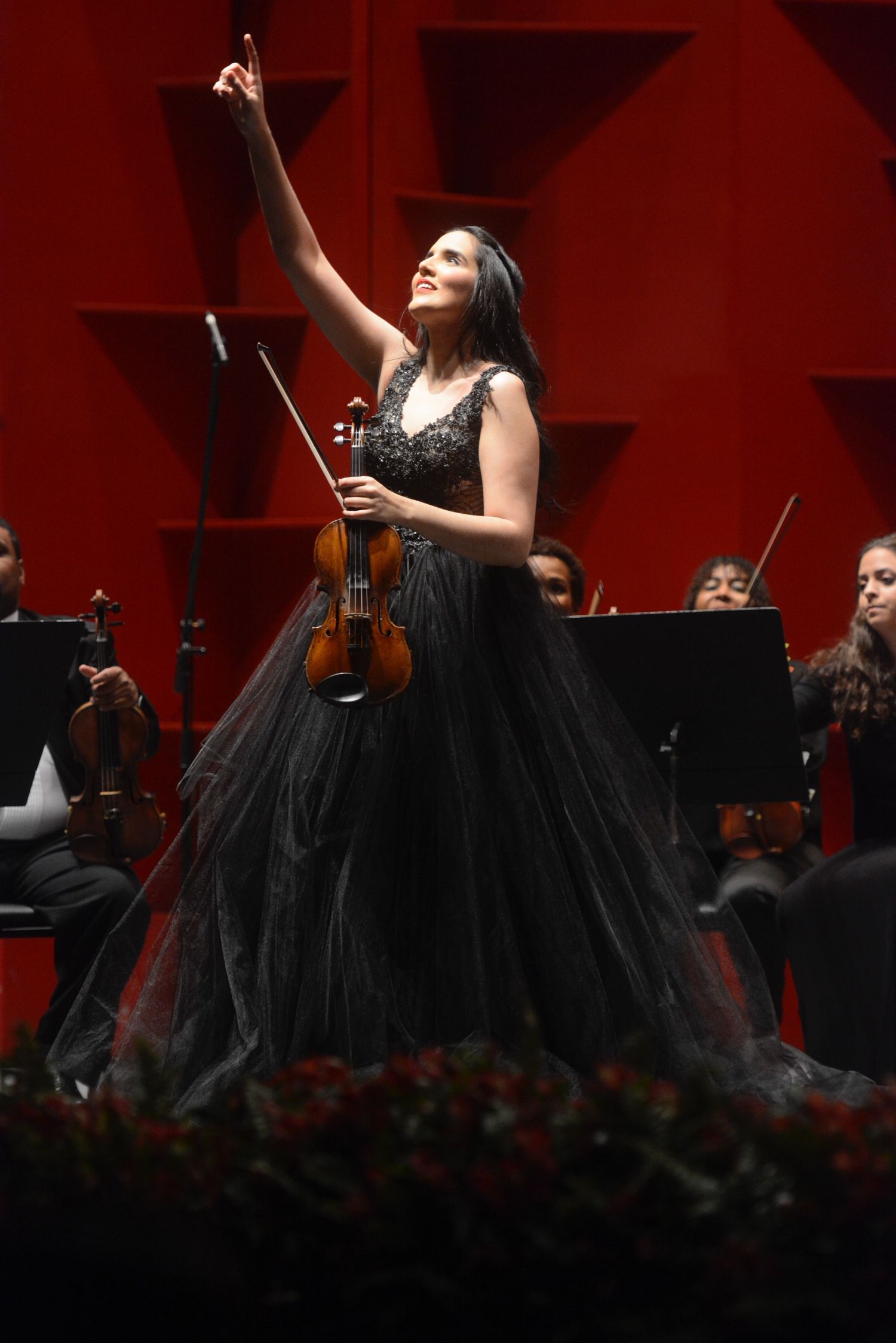
LATINNESS: What an incredible story. And what is your sister doing today? Did she also stay in music?
AISHA: At one point she said to my mom: “Well, there can’t be two stars in the house. I’m not going to make music any more.” I’ve never thought that way, but she does because she has a very outgoing character. Currently, she is a Doctor of Medicine.
After she quit music, she got cerebral encephalitis, so my mother put her back in violin lessons, which helped her recover in a very unique way. As a family, we have experience with classical music, not only in terms of entertainment, but also survival, mental and physical health. Classical music is vital to us.
LATINNESS: Wow! What is a typical day like for you?
AISHA: Well, now that I have my daughter, everything has changed. It usually starts around 6:30 a.m., although it depends on what time Olivia wants to get up. If I’m very lucky, it starts at 7:00 or 7:30 a.m. For my practice, I need to dedicate three to six hours a day, which I combine with the routines that having a one-year-old girl entails.
I also answer a lot of emails daily. Busy. I am happy though, because while the pandemic has stopped the concert tours, it has also forced us to look closely at those areas of our lives that we had left waiting, or that perhaps we did not want to see. For me, it has been a time of reflection and of being able to give warmth to some projects I had always wanted to do.
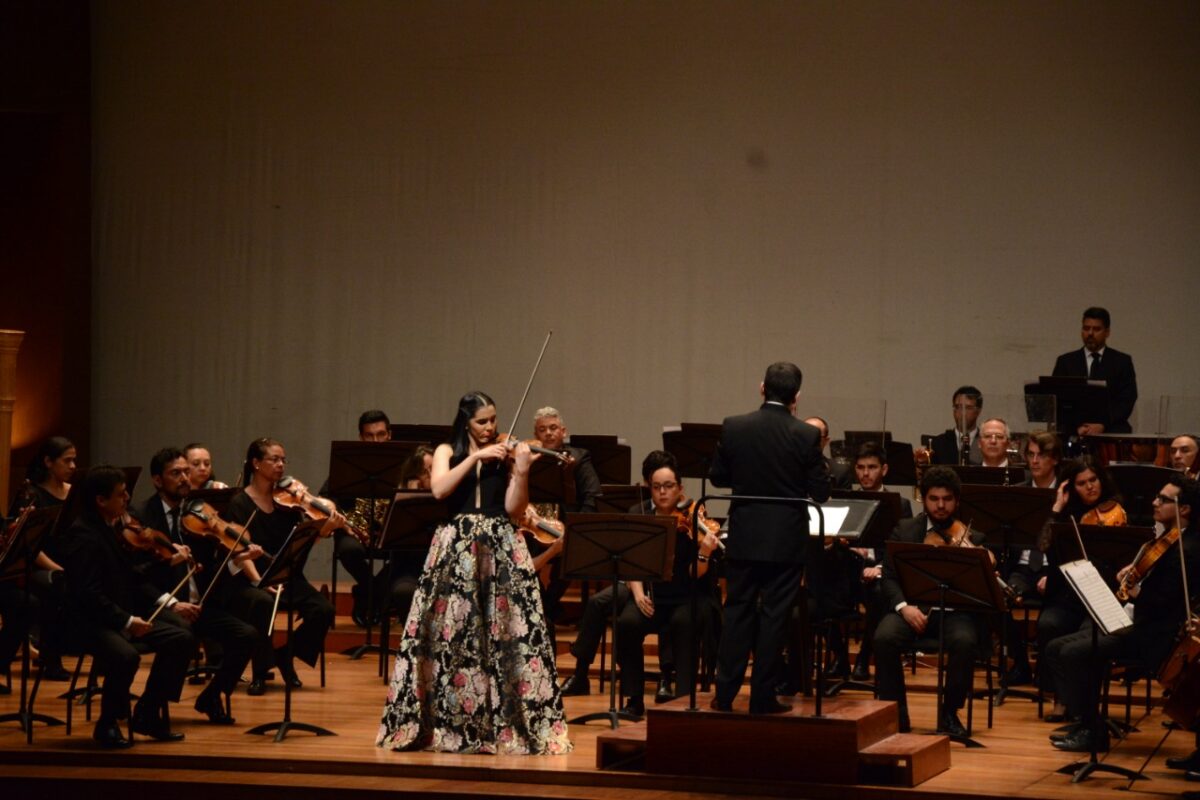
LATINNESS: What projects?
AISHA: Virtual concerts. Us classical musicians, at first we were like: “No!” I used to think things like “my 300-something-year-old violin is not going to be appreciated”. Yet, in the end we all succumb, because art is inside and has to come out and manifest itself in some way.
The project I liked the most was the one I did with the newspaper Diario Libre. There were a total of three virtual concerts, all with works by Johann Sebastian Bach, the greatest of classical music composers and whom Beethoven, Mozart and Schubert all admired.
I decided to do it that way, because having the solitude of the violin and making compositions written only for this instrument, it offered a special connection, especially when everyone was confined to their home.
Other than that, the pre concerts were recorded in two and a half hours, one after the other. For us classical musicians that is a lot of pressure because we like to do things as excellently as possible. For example, recording a fifty-minute record, such as the most recent one I made in London, took me three days, eight hours each day.
We decided on this, and we had thousands of people listening to the livestreams. It meant a lot to me because it was purely classical music.
LATINNESS: You mentioned a 300-year-old violin. How does an artist select their instrument?
AISHA: I’ve been very fortunate to play with instruments that cost 10 million dollars. My sponsor in London and New York, Florian Leonhard Fine Violins, has provided them since I was 18 years old, and it’s a blessing because they are so few, especially the Stradivarius and Guarnerius, which are the brands, so to speak, of the elite. Knowing that the same sponsor has also provided violins to people like Leonidas Kavakos, Maxim Vengerov, who music heavyweights twice my age is incredible to me.
When asked in interviews, I always mention what I said to my mother once before playing with the Stradivarius: “Oh, Mommy, if only I could touch the wood of that violin with my hand!” And you see, God is opening doors and putting people in your path. Since then, everything began to open up. I recorded my third album with the Stradivarius Stevens, which is from the long pattern period. It’s called Stevens because they name each one, and it’s from 1690, even older.
Regarding the question, I would say that when choosing an instrument of that caliber, you have to have a lot of respect for it. The person has to know it and know what its tricks are, that is, the secret things that one finds only with their feet.


LATINNESS: Sure, it makes perfect sense. What would you say is the most rewarding part of your job?
AISHA: When I do my concerts around the world, I like to always schedule social visits. It can be to public schools, hospitals, hospices or even prisons. I know it sounds a bit funny, but you can’t even imagine where I’ve gone to try to bring classical music. I believe it’s a right human beings have and not only for the elite: it’s for everyone, even those who cannot access it due to economic, social or other reasons.
Since 2010 I’ve been visiting different institutions. In Colombia, I was working with the Prema Foundation, which has recreational centers, and every time I go on tour, I remind myself: “Aisha, you love to commit yourself.” I do it regardless of the hours of practice for a concert in another country, the rehearsals, the interviews, the preparation and the jetlag. First, as the Christian that I am, I think it’s a social duty, and second, as I said, classical music is a universal right. That is the most rewarding part.
In Italy, we visited the Gaslini pediatric hospital, the most important in Europe in terms of heart operations, and we treated children who had just come out of surgery for one, or at most, two weeks. It was very rewarding. In London we were at the Royal Hospital for Neuro-disability, and, in some patients, we observed reactions to the music, like movements and such. It was incredible.
LATINNESS: And the hardest part?
Wow! I would say that it’s something perhaps all women have in common. The other day I was reading an article in Today’s Parents to try to nourish myself with all things parenthood, because sometimes you question: “Is this only happening to me?” The girl in the text said that she was a feminist, and that for her being a mother and a feminist was very contradictory. As an advocate for feminism, she did not know how to achieve a balance because she said: “My husband is excellent at home, he is a guru when it comes to bathing children, but even so, I’m the default parent in my household”. It’s almost the same with all of us. In other words, for me, the most difficult part would be the balance.
The first year with my daughter was very rewarding in terms of career, but also very complex because, at times, I had to leave her alone. On each trip, I was faced many times with the decision of whether I should take her or not. I’d say: “I’ll take her,” but then she still didn’t have all her vaccines, and I’d stress about what if there’s a flu, what if this, what if that.
I was breastfeeding for almost five months, but started doing concerts two months after giving birth. I would take the extractor to my hotel room so I could pump. My mother, who is Christian, but a bit liberal, used to tell me: “Look, girl, forget about breastfeeding”; however, it was something very important for me. I wanted to live the experience to the fullest, because I don’t know if I’ll be able to have more children or if we are going to plan it in the future.
I went through my debut at the Carnegie, then a second concert there, then in Brazil, Argentina, Uruguay, London, the debut at the Palau de les Arts in Spain, a gigantic stage with a symphony orchestra of eighty musicians. Also everything that involves the assembly of a single concert. And there were so many trips! The one from India, Wow, my goodness! When I realized how many hours I had to travel… It’s no longer the same when you have a daughter.
I faced that duality because my mother is quite pushy, and since I was little she’s the one who has promoted my career. She was telling me: “Don’t quit your career!” So, every time I traveled, I left the baby with my mother; I never left her with anyone else. And the full-time babysitter.
There are a few moments during the day that I feel: “I got it, I got it right!” Like “Yes, this is it!” And for me that is extremely valuable. My husband is also very flexible, and thank God he is his own boss so we can balance things out a bit more.
LATINNESS: When you find the secret to that balance, let us know. What is the best advice you’ve ever received?
AISHA: I remember one day at the Yehudi Menuhin School that I was waiting to see the nurse. As a young girl I had panic attacks, so I used to go to the infirmary a lot. There was a phrase book there, and when I read it I found this one: “Shoot for the moon because you may land among stars”.
For me it’s very important to project myself towards excellence within an area, and if I don’t reach the highest point, I’m still close… if I don’t reach the moon, at least I’ll reach the stars. On the other hand, I once heard something I loved and that applies to any career, including that of violinist: “It’s not about speed, it’s about endurance”.
As human beings, many times we are in that rat race, and we want to reach the goal, have or do certain things by a certain point in our lives, but it really isn’t about who comes first, but about knowing how to get there. That is very comforting for me. As an artist you need space and mental time to be able to think about your interpretations, and it’s a phrase that fascinates me.
Since I was younger and converted to Christianity, I also heard: “be strong and be brave”. Some say: “God is going to help you with this, God is going to help you with that.” Yes, sure, God helps, but you have to make an effort. Hence, it’s fundamental for me to relearn daily that I have to do my part, and I have to do my best so that the Divine hand decides to bless me.
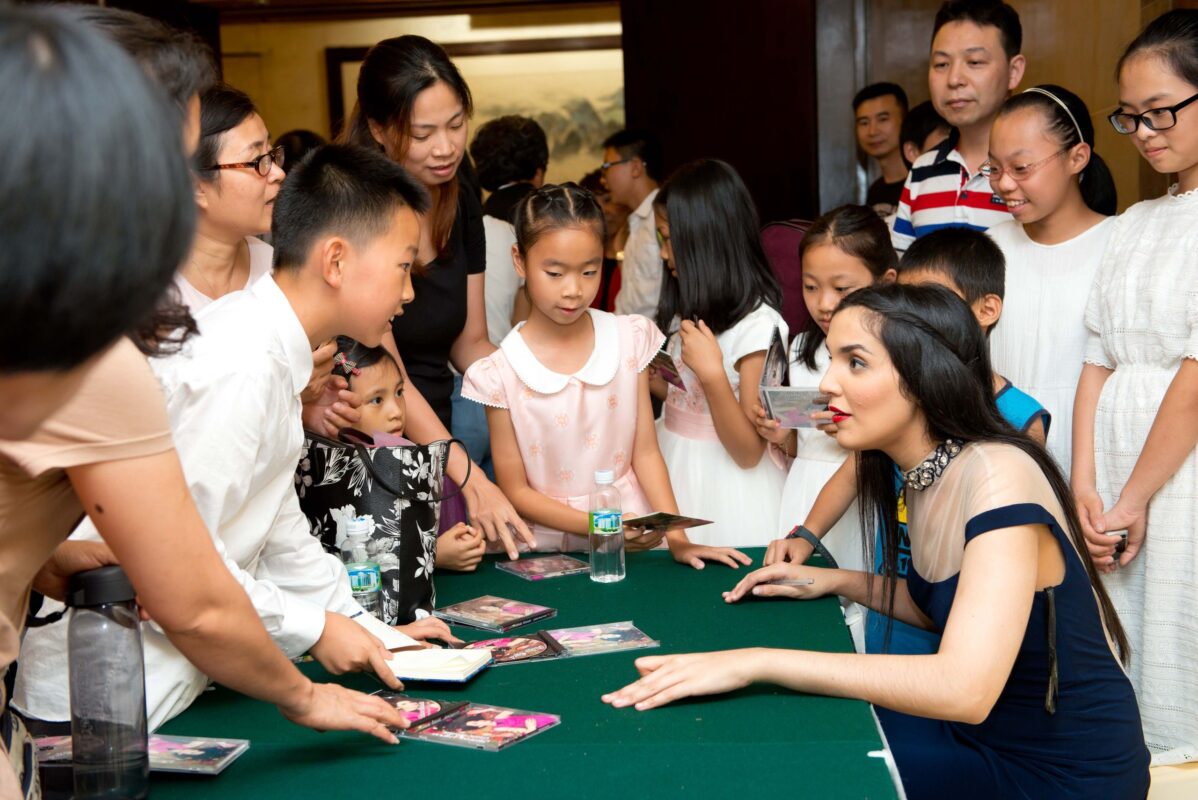
LATINNESS: Is there a concert you remember most fondly?
AISHA: One of the most rewarding years for me was 2019 because I debuted in countless places. Recently, the Palau de les Arts, in Spain, with the Tchaikovsky concert, and the Carnegie Hall- the second concert was sold out.
When we arrived and saw that gigantic poster outside Carnegie with the band that said it was sold out, it was incredible. But in terms of interpretation, I would say the Tchaikovsky concert in Uruguay, at the National Auditorium. We also did an encore piece where I played Bach.
The concerts in Brazil and Argentina were incredibly disturbing because of the transfer itself, because there was no way to travel directly. I had concerts in Entre Ríos, Argentina, with the Entre Ríos Symphony Orchestra, which, in fact, won the Konex award for Best Argentine Orchestra.
After that I left for Brazil to play with the Orchestra of the National Theater of Brazil. They were two totally different concerts: one of Beethoven, which is like saying a War and Peace, that is, a gigantic public literature, and then one of Brahms, which is another heavyweight. So doing one thing day after day was exhausting. In addition to the disturbing part of the travel because I had to take many short flights to get there. Yet I managed by the grace of God.
When they ask me to do things that challenge me, I usually say yes. For example, in Cuba I played a modern concert, that of Algirdas Martinaitis, from Lithuania, and one of Mozart No. 3 in a single night. Doing two presentations, one after the other, was very gratifying.
LATINNESS: What incredible experiences! Is there a theater in which you dream of playing?
AISHA: I always say that there are still many things to do. I wanted to play at the Teatro Mayor Julio Mario Santo Domingo, in Colombia, and I played the Beethoven concert there. I was also honored to have the opportunity to perform twice at Carnegie Hall.
In general, I repeat the sites a lot, because although there are many theaters, the most important in each country are perhaps one or two.
Next year we will have our debut in South Africa, a place I’ve wanted to go. The Cape Town Philharmonic Orchestra is pretty good; for me it’s a new terrain, although now I’m going to Morocco.
Australia and New Zealand are also missing. They’re not places where classical music moves as many people as in New York, London or Paris, but I would love to go, because I simply find them beautiful in terms of landscapes.
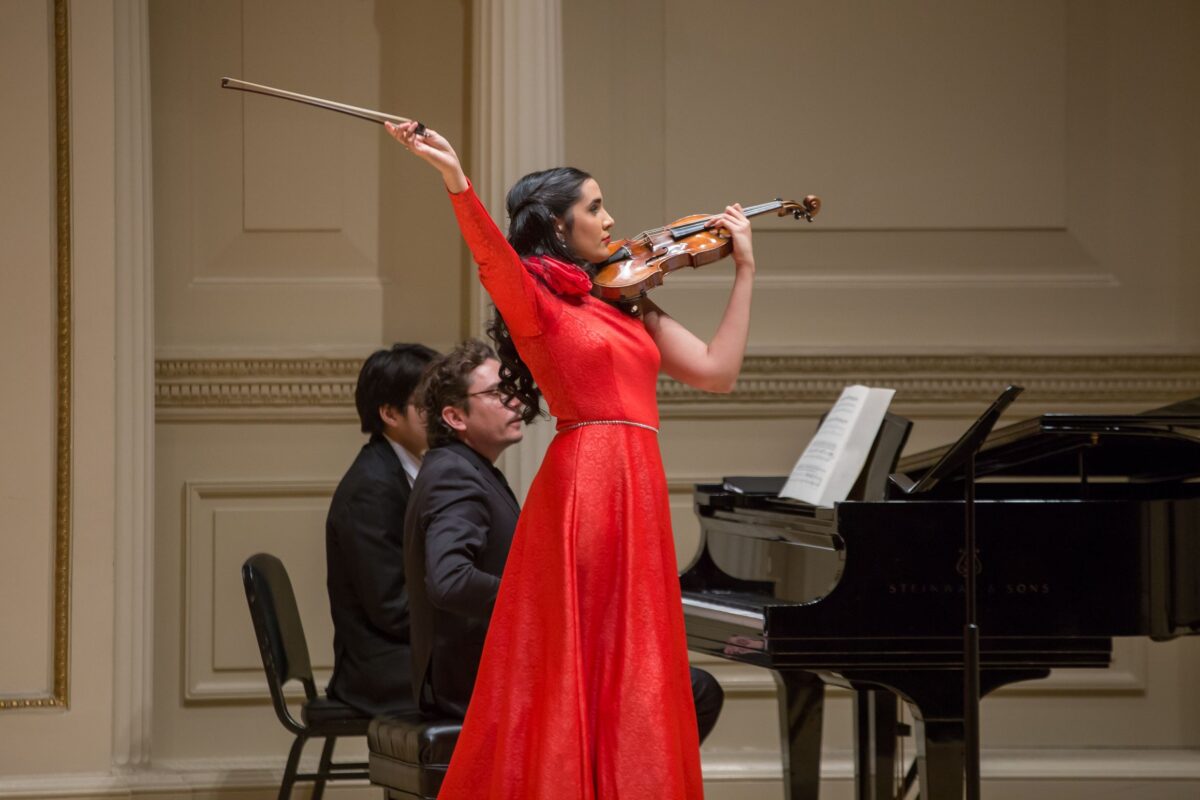
LATINNESS: Where do you see yourself in five years?
AISHA: I hope, with God in front of me, I’m still here and can continue making music. Perhaps by then I’ll have further developed my foundation. This year we have representatives from places like El Sistema, Venezuela and even Colombia, specifically from the Instituto Superior del Teatro Colón. They are free classes and talks to educate the Latin American population about classical music, especially the violin and the viola. This work fulfills me a lot, and I hope I can continue doing more.
LATINNESS: How does it work?
AISHA: We have applications for participants in general or for soloists according to established dates. On this occasion, we’ve chosen seven solo students, who will have individual master classes with me for free. I don’t like taking on students because I have a lot of responsibilities on me, and I need time to practice. When I do, the hour is quite expensive.
In this master class they will have all the participants from those countries as listeners. There will be five thematic talks on the violin, technique, history and interpretation. This is the third consecutive music clinic that we do.
As for festivals, we’ve had them since 2015. In fact, I brought Mark Messenger, Head of Strings at the Royal College of Music, an incredible gentleman in terms of pedagogy, who was decorated by Prince Charles. To have him teach all those lessons at the festivals that we offer to the kids for free is very rewarding. It really fulfills me.
LATINNESS: What an inspiring project. What do you love most about the Latin culture you grew up in?
AISHA: I’m going to tell you an anecdote about the day I auditioned for the Royal College of Music. I was with my mom, and I remember crying and crying the day before thinking: “My God, what am I going to do? A single scholarship and more than 3,000 people applying to gain entry to the university. Help me!”
Just before entering the audition, my mother told me: “Look, forget about Russian, Chinese, Japanese, whatever. You are Latin, and you are going to represent what we Latin Americans are”. She showed me videos of Gustavo Dudamel, Miss Universe Amelia Vega and many people of whom we have to be proud, and declared: “This is who you are, this is what you are going to represent. You are going to see that, with God in front of you, the scholarship will be yours.” And to the glory of God, it was.
That’s the message: be authentic, be proud of where we come from and try to share it with the world. For me, it’s very important that I’m Dominican, but also that I’m Latin American. In the beginning I always thought: “Why wasn’t I born in Europe? I would’ve had better teachers.” But of course not! For me, being Latin American has become a force that many other people do not have. For me, being born in Latin America is one of the most important things about me.
Images courtesy of Aisha Syed.

